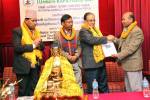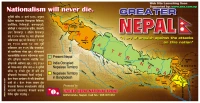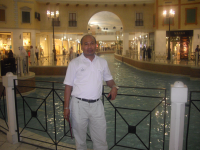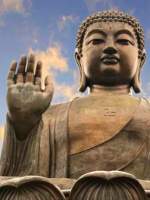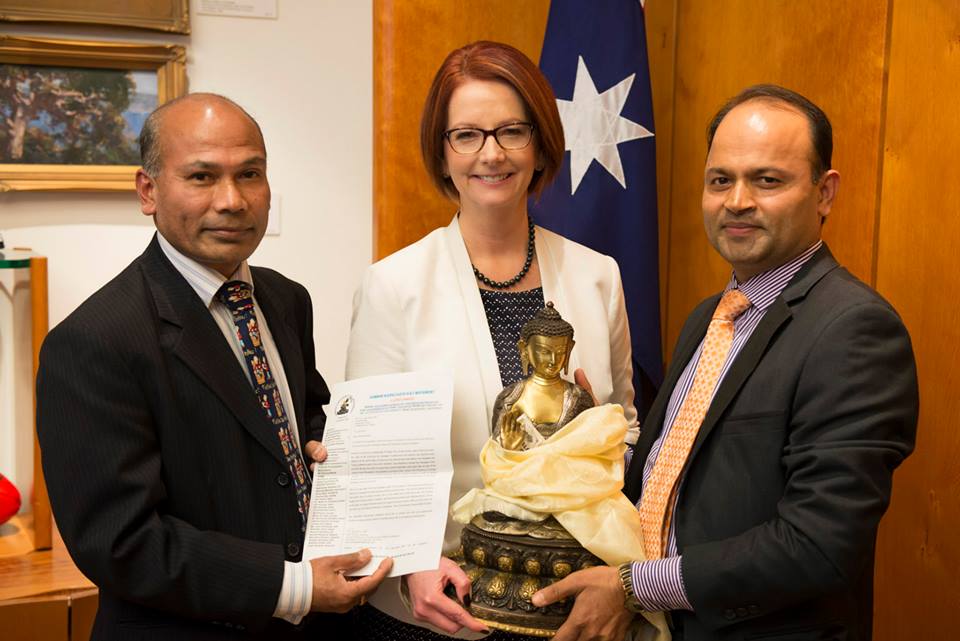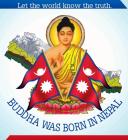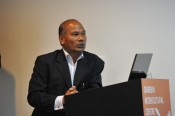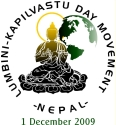Archive for the ‘Interview’ Category
Posted by Ram Kumar Shrestha on September 5, 2013
In an exclusive interview with Global ahead of the G20 summit in St Petersburg, Japanese Prime Minister Shinzo Abe describes how his Abenomics policy could not only kickstart Japan, but help reboot the world economy

Abe pictured with US Ambassador to Japan John V. Roos. Japan is keen to maintain a close relationship with the USA
Prime Minister, you have enjoyed a spectacular comeback in Japanese politics. Since you took office after the December election, the philosophy of ‘Abenomics’ has totally swept away any disappointment that arose during your first term as premier in 2006-07. A rapid series of political and economic manoeuvres aimed at lifting Japan out of its economic torpor has won you popularity at home and plaudits from abroad. You have launched dramatic initiatives towards Africa and attempted to repair long-neglected fences with ASEAN neighbours.
Now, in the lead-up to the G20 summit in St Petersburg, there is revived interest in Japan’s role as the world’s number three economy, as well as in the global lessons to be learned from Abenomics and its associated policies. It is a remarkable success in a very short time. But it raises many questions about where a reinvigorated, resurgent Japan might be heading. Read the rest of this entry »
Posted in Interview | Tagged: Abenomics, g20, Global Economy, Japanese economy, Shinzo Abe | Leave a Comment »
Posted by Ram Kumar Shrestha on July 6, 2012
[ Janak Sapkota is from Nepal, currently a postgraduate science student in Finland. He has published Lights Along the Road, a collection of haiku co-authored with the American poet Suzy Conway. He won the Smurfit Samhain International Haiku Prize 2006 and the Seventh Annual Ukia Haiku Competition 2009. While on a writing residency at Cló Cheardlann na gCnoc, Donegal, Ireland, he published Full Moon, a limited edition haiku with Irish- language translations by Gabriel Rosenstock and images by Danielle Creenaune. He is, therefore, an internationally recognized poet, however; shadowed in his own motherland and this is just an attempt to bring him among Nepali community]

Indiasaijikiworlkhaiku
“A young Nepalese contemplative poet with a prodigious talent for writing haiku, is a visionary mediator between the self and the spirit. In his haiku of radiant light and rare insights he marvels at the mystery. He is attentive both to the World and to the word. He is truly alive to the awe, to the awesomeness of the creation.”
He has published Lights Along the Road (Bamboo Press, 2005), a collection of haiku co-authored with the American poet Suzy Conway. He won the Smurfit Samhain International Haiku Prize 2006 and the Seventh Annual Ukia Haiku Competition 2009. While on a writing residency at Cló Ceardlann na gCnoc, Ireland, he published Full Moon (Cló, 2010), a limited edition of his haiku with Irish language translations by Gabriel Rosenstock and images by Danielle Creenaune.
His haiku have appeared internationally in journals, magazines and newspapers such as The SHOp, Shamrock, Lishanu, Fri Haiku and Notes from the Gean. His recent collections include Whisper of Pines (Original Writing, 2012) a bilingual English-Irish edition with Gabriel Rosenstock and A Firefly Lights the Page (SanaSato, Finland, 2012), a bilingual English-Finnish edition by Arto Lappi. Read the rest of this entry »
35.387579
-85.962483
Posted in Interview, Miscellaneous | Tagged: Balkrishna Sama, Bhupi Sherchan, Danielle Creenaune, Gabriel Rosenstock, Germain Droogenbroodt, Gopal Prasad Rimal, Haiku, Janak Sapkota, Laxmi Prasad Devkota, Lekhnath Poudyal, Mícheál Ó hAodha, Muna Madan, Seán Mac Mathúna, Survivor, Susumu Takiguchi, The World Haiku Club, World Haiku Review | Leave a Comment »
Posted by Ram Kumar Shrestha on May 15, 2012

 His Holiness the Dalai Lama sat down with Arianna Huffington at St. Paul’s Cathedral in London to celebrate his Templeton Prize, and discuss the importance of a productive conversation between spirituality and science.
His Holiness the Dalai Lama sat down with Arianna Huffington at St. Paul’s Cathedral in London to celebrate his Templeton Prize, and discuss the importance of a productive conversation between spirituality and science.
The Dalai Lama’s role in fostering positive interactions between religion and science is one of the reasons why he was honored by the prize.
As the Templeton Foundation notes: “For decades, Tenzin Gyatso, the 14th Dalai Lama has vigorously focused on the connections between the investigative traditions of science and Buddhism as a way to better understand and advance what both disciplines might offer the world.”
Arianna Huffington also asked HH Dalai Lama about the importance of sleep; the epidemic of stress, anxiety, and drugs — legal and illegal; and compassion, which is emphasized in the practice of Buddhism.
The Templeton Prize comes with a cash award of $1.7 million dollars, which His Holiness has donated to Save The Children.
Read the transcript of the interview below:
Arianna Huffington: You have been working with neuroscientists for many years now. What do you hope to achieve through this collaboration between science and spirituality?
His Holiness the Dalai Lama: Two purpose: One purpose, up to date scientific research mainly based on matters. Now, later part of 20th century, and now beginning of this 21st century, now scientific research field now expanding, including human emotions, mind. That’s one purpose. The reason we cannot explain fully what humans are thinking about these thing just on research on brain alone. That’s one purpose. The second purpose: on the basis of scientific finding, more awareness, the how importance of our emotion for our health and healthy society and family. Now, through training of mind, how much can develop our health, our healthy society. So, and me personally, my main effort to promote these values, not through religious field, but without touching religion, simply use our common sense and common experience and then scientific finding, so to make more awareness to public. My main hope is eventually, in modern education field, introduce education about warm-heartedness, not based on religion, but based on common experience and a common sort of sense, and then scientific finding. So in that respect, you see, I’ve found a lot of useful information from scientific research work. Read the rest of this entry »
35.387579
-85.962483
Posted in Interview | Tagged: Arianna Huffington, Buddhism, Compassion, Dalai Lama, Dalai Lama 2012, Dalai Lama Interview, Dalai Lama News, HH Dalia Lama, His Holiness Dalai Lama, Religion And Science, Religion News, Slideexpand, Templeton Foundation, Templeton Prize, Tibet, Video | Leave a Comment »
Posted by Ram Kumar Shrestha on March 11, 2012
Lisa Choegyal is a tourism consultant who works throughout the Asia Pacific region, specializing in pro-poor sustainable tourism planning and marketing. With a background in the private sector, she was for over 20 years Director of Marketing of Tiger Mountain, Nepal’s pioneer trekking, adventure and wildlife operator. Based in Kathmandu, she has worked since 1992 as a senior associate of TRC Tourism (formerly Tourism Resource Consultants) in Wellington, New Zealand (www.trctourism.com). Lisa was Team Leader of the ADB Ecotourism Project 2000-2001, DFID tourism monitor on TRPAP 2001-2005, tourism-marketing specialist for the ADB SASEC program 2004-2008, and prepared the UK Aid DFID Great Himalaya Trail development program for SNV Nepal 2006-2010. She serves on a number of non-profit boards related to tourism and conservation, and is New Zealand Honorary Consul to Nepal since 2010.


DUNHAM: How do you assess the current framework for development in Lumbini, the framework that is already and has been in place for a long time?
CHOEGYAL: The institutional framework is interesting with so many stakeholders, different factions and historical complexities. UNESCO has a crucial role to play to preserve its world heritage status. The Lumbini Development Trust (LDT) is the obvious main custodian although it needs to be evolved into an Authority rather than a Trust. It is typical of the current political scenario that existing institutions become politicized. . Perhaps it was felt, in this case, that it is easier to create a parallel organization and just blow LDT out of the water. Three billion dollars is a convincing figure.
I’ve worked on Lumbini, from a tourism perspective, on and off, for the last twenty years but most recently with the Asian Development Bank (ADB) tourism infrastructure study, where I was part of a consulting team that designed the South Asian Sub-regional Economic Cooperation (SASEC) tourism components. SASEC is an ADB grouping of five countries: Bangladesh, Bhutan, India – actually the north and northeast States of India – Nepal and Sri Lanka. We worked for six years as tourism sector advisors on the SASEC program with our firm, TRC Tourism, which is based in Wellington, New Zealand. SASEC was modeled on the ADB’s Greater Mekong Sub-Region tourism program, on which TRC had also been tourism advisors (Cambodia, China (PRC, specifically Yunnan and Guangxi), Lao PDR, Myanmar, Thailand, and Viet Nam).
In many ways, South Asia was easier than the Mekong because we were dealing with countries that were used to working together in tourism, and had been cooperating and selling joint packages for decades — whereas in the Greater Mekong, many of them had been emerging from long-term conflicts. We were able to make a lot of headway in the tourism sector in South Asia, whereas other SASEC sectors, such as water resources roads and large-scale infrastructure had a much more complex agenda.
Lumbini emerged as being one of the priority areas in the sub-region for tourism development using a sub-regional rationale, linked, as it is, very convincingly, with the footsteps of the Lord Buddha circuit in India. Of course it is also an incredibly important national tourism site for Nepal. Read the rest of this entry »
35.387579
-85.962483
Posted in Interview | Tagged: Asia pacific, Aurorakot, Devdaha, DIFID, Gotihawa, Great Himalaya Trail development program, Kapilvastu, Kudan, LDT, Lumbini, Lumbini Development Trust, Niglihawa, Ramgram, Sagarhawa, Sishania, SNV, South Asian Sub-regional Economic Cooperation (SASEC), Tiger Mountain, Tilaurakot, Unesco | 1 Comment »
Posted by Ram Kumar Shrestha on March 11, 2012
Axel Plathe is the Head of Office and UNESCO Representative to Nepal. Mikel Dunham spoke to him in his office in Kathmandu, March 6, 2012.


DUNHAM: Perhaps the best way to begin is for you to describe UNESCO’s interest and involvement with Lumbini.
PLATHE: As you know, the site was inscribed in 1997 in the World Heritage list. Since then UNESCO has been engaged in Lumbini more or less strongly. We have particularly been helping, throughout the years, since the inscription, in managing the site. We have helped the government in establishing an approach on how to manage this World Heritage site.
We have also helped the government in the very cumbersome and heavy reporting exercise that the World Heritage Convention requests from state parties to the Convention.
Every second year, the state party, (in this case the government of Nepal), has to submit a report on the status of preservation of Lumbini. Read the rest of this entry »
35.387579
-85.962483
Posted in Interview | Tagged: Buddha, Constantino Meucci, Kenzo Tange, Lumbini, Unesco, World Heritage convention, World Heritage list | Leave a Comment »
Posted by Ram Kumar Shrestha on March 7, 2012
Dr. Rijal is a member of Nepal’s recently created Greater Lumbini Development National Steering Committee, chaired by ex-Prime Minister Pushpa Kamal Dahal “Prachanda”. Dr. Rijal, a member of the Nepali Congress political party, is also a current member of the Constituent Assembly, ex-Minister of Culture and Chairman of Apex College. Mikel Durham interviewed Dr. Rijal focussing on Lumbini issue.
 DUNHAM: You’ve recently been appointed as a Member of the Greater Lumbini Development National Steering Committee. Now that the committee has been created, what progress can be reported?
DUNHAM: You’ve recently been appointed as a Member of the Greater Lumbini Development National Steering Committee. Now that the committee has been created, what progress can be reported?
RIJAL: So far, we have not been able to spend as much time as is needed to move the Lumbini project forward. Prachanda is terribly busy with the politics of the country. In some respects, I am also quite busy — nothing compared to his busy schedule but –
DUNHAM: How many members are on the committee?
RIJAL: Right now we are a six-member committee. And then there is a provision to add another eleven members later on.
DUNHAM: Prachanda is Chair.
RIJAL: Yes.
DUNHAM: What has the committee actually done so far?
RIJAL: We went to New York and saw the Secretary General (SG) of the UN, Ban Ki-moon, in November. And the reason we went was that we wanted the involvement of the UN in the development of Lumbini.
went was that we wanted the involvement of the UN in the development of Lumbini.
It all started, however, when, earlier, I was the Minister of Culture. At that time, I established contact with Ban Ki-moon’s office and he extended an invitation. I went there. I presented my argument on Lumbini and he was very keen. He has long been interested in helping Lumbini and in realizing its potential. I knew that his mother was a devoted Buddhist and felt that her son, as Secretary General, should do something for Lumbini.
For his part, Ban Ki-moon also feels that it is his obligation on behalf of the larger Asian Buddhist community– he is the second Asian Secretary General – to do something for Lumbini.
That was one reason, last November, that we thought he could be of great help. And the visibility of his office was going to be very important to help Lumbini realize its potential.
We had a very nice conversation. He was the one who told us that Madam Bokova [Director-General of UNESCO] is also very keen to see that Lumbini is developed to it’s potential. She’s very interested in the preservation site. Read the rest of this entry »
35.387579
-85.962483
Posted in Interview | Tagged: APECF, Ban Ki-Moon, Buddha, Buddhism, Greater Lumbini Development National Steering Committee, Lumbini, Prachanda, U Thant, UN, UNDP, Unesco | Leave a Comment »
Posted by Ram Kumar Shrestha on March 5, 2012

AHMAD JAMSHID / AP
Pakistan Foreign Minister Hina Rabbani Khar speaks during a joint press conference with her Afghan counterpart Zalmai Rasool, unseen, at the foreign ministry in Kabul, Afghanistan, Feb. 1, 2012.
Since she was appointed as Pakistan’s Foreign Minister in July of 2011, Hina Rabbani Khar has had to deal with the fallout from the American raid that killed Osama bin Laden in May, a deterioration in relations with Afghanistan, and a botched cross border operation that saw 24 Pakistani soldiers mistakenly killed by U.S. forces in November. She is Pakistan’s youngest and first female foreign minister. On the eve of her first high-profile visit to Kabul since the assassination of Afghan peace envoy Berhanuddin Rabbani (no relation), she talks about her country’s relationship with Afghanistan, the U.S., and with its own army.
(READ: NATO report says Pakistan is still propping up the Taliban.)
TIME: What prompted your trip to Kabul?
Hina Rabbani Khar: As Foreign Minister of Pakistan, I would say that the most important capital in the world is Kabul. If this track works, if Pakistan and Afghanistan can work with confidence in each other’s intentions and actions, we can go a very long way. With that trust we can fix a lot of things and will not need outside influence and interference. Therefore we would be open to engage with Afghanistan at any level and at any time. Since 2008 [when the elected government came to power] we have given a very consistent message to Afghanistan that we mean business, that we would want to support anything that Afghans feel is for their betterment. They have to choose the direction, and we would be behind them following that direction. Read the rest of this entry »
35.387579
-85.962483
Posted in Interview | Tagged: af-pak, Drones, Foreign Minister, Hina Rabbani Khar, Isi, Kabul, Nato, Pakistan, Pakistan Military, salala, Taliban | 1 Comment »
Posted by Ram Kumar Shrestha on February 2, 2012
Prime Minister Baburam Bhattarai, who is also the head of the Special Committee, has decided to immediately begin the process of sending home the combatants opting for voluntary retirement and completing the process in the next 12 days, and then moving ahead with the integration process.
The constitution drafting has come to a standstill, and according to media reports there have been some exercises for changing the government to bring in a national consensus government. Bhattarai talked to Republica´s Post B Basnet and Madhav Dhungel in this context. Excerpts:
Immediately after you were elected prime minister, you promised to prioritize peace, constitution, good governance and economic prosperity along with a relief package for the people. Five months on, how do you evaluate your performance?
Yes, following my election to the helm on August 28 by the legislature-parliament, I had stated after doing some rational thinking that the task of this government would be peace, constitution, good governance and economic prosperity along with relief to the people. Afterwards I modified things a bit and set my priority on peace, constitution, good governance and economic prosperity. I have put in my best efforts for the achievement of my goal.
But you did not achieve anything substantial.
You have got to be ambitious. As poet Laxmi Prasad Devkota stated: “The only objective worth taking up is to touch the moon.” Without setting a lofty ambition, you won´t achieve anything important. In fact, the stalled peace process has received momentum after I took over at the helm. The categorization process for Maoist combatants is over. Similarly, we are bidding adieu from January 31 to those opting for voluntary retirement and are subsequently taking the process of integration forward. There are ups and downs in the process.

The subcommittee under the Constitutional Committee (CC) has also garnered consensus on many issues, and discussions on other contentious issues are underway. The long overdue State Restructuring Commission was also formed and it is submitting its report to the government on Monday. As far as the remaining two agendas – good governance and economic prosperity – are concerned, I have launched some immediate relief packages. But we have not been able to focus on these issues. A detailed plan for good governance and economic prosperity was launched on January 25. We think the move will definitely make people feel the change. Read the rest of this entry »
35.387579
-85.962483
Posted in Interview | Leave a Comment »
Posted by Ram Kumar Shrestha on December 5, 2011
The prize-winning author of The God of Small Things talks about why she is drawn to the Occupy movement and the need to reclaim language and meaning
By Arun Gupta

Arundhati Roy: 'The expropriators should have their wealth expropriated.' Photograph: Sarah Lee
Sitting in a car parked at a gas station on the outskirts of Houston, Texas, my colleague Michelle holds an audio recorder to my cellphone. At the other end of the line is Arundhati Roy, author of the Booker Prize-winning The God of Small Things, who is some 2,000 miles away, driving to Boston.
“This is uniquely American,” I remark to Roy about interviewing her while both in cars but thousands of miles apart. Having driven some 7,000 miles and visited 23 cities (and counting) in reporting on the Occupy movement, it’s become apparent that the US is essentially an oil-based economy in which we shuttle goods we no longer make around a continental land mass, creating poverty-level dead-end jobs in the service sector.
This is the secret behind the Occupy Wall Street movement that Roy visited before the police crackdowns started. Sure, ending pervasive corporate control of the political system is on the lips of almost every occupier we meet. But this is nothing new. What’s different is most Americans now live in poverty, on the edge, or fear a descent into the abyss. It’s why a majority (at least of those who have an opinion) still support Occupy Wall Street even after weeks of disinformation and repression. Read the rest of this entry »
35.387579
-85.962483
Posted in Interview | Tagged: Arundhati Roy, Booker Prize, Occupy Movement, The God of Small Things, Wall Street | 1 Comment »
Posted by Ram Kumar Shrestha on November 29, 2011
Republica
Deputy Prime Minister and Foreign Minister Narayankaji Shrestha is back after wrapping up his week-long visit to China in the wake of Chinese Premier Wen Jiabao´s impending visit to Nepal in mid-December. OurSpecial Correspondent Purna Basnet met Shrestha in Hong Kong on his way back to Kathmandu. Excerpts:
in the wake of Chinese Premier Wen Jiabao´s impending visit to Nepal in mid-December. OurSpecial Correspondent Purna Basnet met Shrestha in Hong Kong on his way back to Kathmandu. Excerpts:
How did your first China visit as a foreign minister go?
After becoming foreign minister, I have been to UN General Assembly, India and SAARC summit under the leadership of prime minister. This is the first formal foreign visit under my leadership and it has been very fruitful. We held cordial discussions on all aspects of bilateral relations and I am confident that we will see positive results soon.
What would such positive results be?
Nepal-China friendship should not be seen as just another neighborly relation. It holds great significance. We could convince China to expand financial help to Nepal which was one of the two major agendas of my visit. China is likely to announce an increment in its annual grant to Nepal during the Chinese premier´s visit in December. We have also sought a one-time special grant at a time when we are approaching the final stage of the peace process and constitution drafting.
Did you have any discussion on reducing the massive trade deficit with China?
We had serious discussion on increasing bilateral trade and reducing the trade deficit. We have not been able to capitalize on the duty waiver offered by China on export of around 400 goods. Therefore, this time we urged China to provide waiver on those goods that we can export. They have asked us to provide a list of such items. Read the rest of this entry »
35.387579
-85.962483
Posted in Interview | Tagged: Budi Gandaki, Hilsa-Simikot road, Jomsom-Beni roads, Kimathangka-Biratnagar road, Lumbini, Nepal-China friendship, North-south roads, Nursinggad projects, SAARC, Train service to Lumbini, West Seti | Leave a Comment »
Posted by Ram Kumar Shrestha on September 14, 2011
REPUBLICA

Xiao Wunan
There has been great excitement, debate and controversy about the plans of the Asia Pacific Exchange and Cooperation Foundation (APECF) to mobilize investment of US$3 billion for the development of Lumbini as a Special Development Zone (SDZ). Purna Basnet caught up with Xiao Wunan, executive vice-chairman of APECF in Four Seasons Hotel, Hong Kong last Friday to shed more lights on the issue.
mobilize investment of US$3 billion for the development of Lumbini as a Special Development Zone (SDZ). Purna Basnet caught up with Xiao Wunan, executive vice-chairman of APECF in Four Seasons Hotel, Hong Kong last Friday to shed more lights on the issue.
EXCERPTS:
What is the current position of the Lumbini plan?It is in the planning stage. Some reports said China is investing US$3 billion but without a feasibility study no one can invest such a big amount. We will hire a professional team for planning, which will take about one year. We hope that will happen faster but it will certainly take at least six months. APECF needs a concrete idea to come to Lumbini. APECF signed the MoU with UN Industrial Development Organization (UNIDO), Beijing, for feasibility study. UNIDO is a consultant for planning and framework designer of the project.
Was a MoU actually signed with UNIDO?
Yes, but there has been some misunderstanding and distortion in this regard. The misunderstanding was that UNIDO would get a slice of the profits. But that’s not the case; UNIDO was acting as a consultant for planning.
But the UNIDO headquarters refused to recognize the MoU. What is your take on that?
I cannot answer this question on the record.
Don´t you think that the MoU signed by APECF and UNIDO in Beijing is against Nepal’s national sovereignty?
It is a part of the process. When we wanted to do this project, we needed to get the approval of Nepal. Before signing the MoU with UNIDO, I met more than 10 members of the cabinet of Nepal, including the finance and deputy prime minister and culture minister. UNIDO as a consultant was advising us on whether or not to go ahead with this project and how to carry it out.
We hired five organizations, among them a famous US think tank, to study the possibility of this project and a bank to advise us on the investment risks. So, before all these study reports come out, we would not know what the political, economic and social risks are. The MoU was signed just for feasibility study. Lumbini belongs to Nepal and Nepali people are going to benefit from it. So this is not against Nepal´s national sovereignty. Read the rest of this entry »
35.387579
-85.962483
Posted in Global, Interview | Tagged: Buddha birth place, Lumbini Plan, Lumbini Project, Nepal’s national sovereignty, UNIDO, Xiao Wunan | Leave a Comment »
Posted by Ram Kumar Shrestha on June 7, 2011
By FRÉDÉRIC KOLLER/LE TEMPS/WORLDCRUNCH
This post is in partnership with Worldcrunch, a new global news site that translates stories of note in foreign languages

Newly elected head of the Tibetan government-in-exile Lobsang Sangay in New Delhi, India, Thursday, May 12, 2011. Tsering Topgyal / AP
into English. The article below was originally published in Le Temps.
Although he will continue to serve as Tibet’s spiritual leader, the Dalai Lama is done with politics. He announced his retirement earlier this year. An international icon, the Dalai Lama no doubt leaves some very big shoes to fill.
Who exactly will take on that tall task? Meet Lobsang Sangay, a former Tibetan Youth Congress leader who has spent 16 years in the United States. Just 42, Sangay was elected last month as the Kalon Tripa, or prime minister of the Tibetan Government-in-Exile. Observers say he represents a new generation of Tibetan people who want more action to be taken to free Tibet. He’ll have a chance to prove that starting Aug. 14, when he is scheduled to join the exile government in Dharamsala, India. He spoke with Le Temps from Dharamsala.(See the top 10 Twitter controversies)
Le Temps: What kind of program did you present to be elected prime minister?
Lobsang Sangay: The two key points are: freeing Tibet and helping His Holiness the Dalai Lama return to Lhasa, Tibet’s capital city.
You are the first Kalon Tripa to be elected democratically, and the first who has real influence. Will you be independent from the Dalai Lama, who remains Tibet’s spiritual leader?
His Holiness the Dalai Lama has been an excellent leader. He has governed us very well and we are all indebted to him. There is no way I am going to replace him. Instead, I am going to try to make his vision of a secular democratic society come true. I will do my best to act as the new image and the new political spokesman for the Tibetan movement.
You also represent the new Tibetan generation born in exile. Apparently, it has more fighting spirit than the generation that fled Tibet in 1959. Is there a generational conflict?
I was elected with the support of both the older and new generations. The older Tibetans have said they have faith in the young generation. They have passed responsibility for continuing the movement down to us. As I represent this young generation, I want to respect this legacy. This election has sent a clear message to China: the movement is not going to be less influential just because it is led by the new generation. We will fight as long as necessary to free Tibet. Emotionally speaking, we feel as much attached to Tibet as does the older generation. We are still one single family. The majority of young people also voted for me. They want a more active leader.(See the Best Blogs of 2011) Read the rest of this entry »
35.387579
-85.962483
Posted in Interview | Tagged: Dalai Lama, Dalai Lama successor | Leave a Comment »
Posted by Ram Kumar Shrestha on May 11, 2011

Domo Geshe Rinpoche
On the occasion of 2555thBuddha Jayanti and the first Anniversary of Kapilvastu Day Movement, KDM is presenting an

Agni Frank Eickermann
interview with its two Advisors Agni Frank Eickermann and Domo Geshe Rinpoche. On behalf of Kapilvastu Day Movement Ram Kumar Shrestha took this interview with them.
Agni Frank Eickermann: Founder:Chateau Amritabha, Riebeuvillé, France. Author of 11 books, some translated in English, German, Swedish, Chinese, Russian, Dutch, Italian, French and Spanish. Founder: Spiritual Teachers Training with more than 300 teachers worldwide. Founder: Alpha Chi Consultants (1200 Feng Shui Consultants on 5 continents). Founder : “Path into Light”, conducted in 39 countries.Founder: over 100 Light-Center in 50 countries and all continents. Speaker: Spirituality, Traditional Chinese Medicine, Feng Shui, Management solutions, Golden Age.
Domo Geshe Rinpoche. Tara Wangchuk: Spiritual Director, White Conch Dharma Center. Rinpoche is considered to be a reincarnated Tibetan high lama of the Geluk order. Her healing-related talks are accessible Western interpretations of Tibetan Buddhist teachings on how to achieve spiritual and emotional wellbeing. She is also theFounder and Director of the Tibetan-American Friendship Foundation and Tibetan Resettlement andProject Coordinator for the largest community of Tibetans in the U.S. Read the rest of this entry »
35.387579
-85.962483
Posted in Interview | Tagged: 2555TH BUDDHA JAYANTI, Agni Frank Eickermann, Alpha Chi, Alpha Chi Consultants, Anniversary, Buddha, Buddha jayanti, Buddhism, Buddhist Circuit, Chateau Amritabha, Domo Geshe Rinpoche, Feng Shui, Feng Shui Consultants, Founder, France. Author, Geluk, Golden Age, Healing-related talks, Kapilvastu, Kapilvastu Day Movement, Light-Center, Lumbini, Management solutions, Nawalparasi, Nepal, Path into Light, Project Coordinator, Reincarnated Tibetan High Lama, Reincarnation, Religion, Riebeuvillé, Rinpoche, Rupendihi, Speaker, Spiritual and emotional wellbeing, Spiritual Director, Spiritual Teachers Training, Spirituality, Tara Wangchuk, the birthplace of Buddha, tibetan, Tibetan Resettlement, Tibetan-American Friendship Foundation, Tibetans, Traditional Chinese Medicine, Unesco, Western interpretations of Tibetan Buddhist teachings, White Conch Dharma Cente, World peace | 1 Comment »
Posted by Ram Kumar Shrestha on April 29, 2011
As head of Nepal’s most powerful party, the Unified Communist Party of Nepal (Maoist), Pushpa Kamal

PUSHPA KAMAL DAHAL PRACHANDA: ‘We are not anti-Indian. Relations between India and Nepal are unique on the basis of history, culture, geography, and economy. No one can think of weakening this.' — PHOTO: REUTERS
Dahal Prachanda’s position holds the key to the political developments in the republic. On April 26 (Tuesday night), Mr. Prachanda spoke exclusively to Prashant Jha to discuss the state of transitional politics in Nepal, internal party divisions, and relations with India. Excerpts:
Will Nepal have a new constitution by May 28?
We should have been able to conclude the peace process and promulgate the statute by May 28. But the absence of an agreement between political parties has limited that possibility. I won’t say it is impossible, because we have often made historic decisions at the last minute. As the largest party in the CA, and as the force that pushed the agenda of the Constituent Assembly, republic, federalism, secularism, social justice, inclusion, proportional representation, we are committed to taking the peace process forward and creating a unified draft of the constitution before May 28 so that the Nepali people believe these tasks will be completed. They themselves would happily give us time after that.
Why did the parties fail to come to an agreement?
The first reason is that we were in a movement against the last government, since they were trying to isolate the biggest party in the CA. Our claim was that Maoists should lead the government, but others did not accept our legitimate claim. Then we went in for elections in parliament, but could not elect a PM for seven months. The disagreement between parties was one reason for this, but we also felt that various other forces tried to create obstacles in government formation. We then sacrificed our claim, but it was too late to take the process forward.
In the earlier stages, it was agreed that parties would move ahead together, in consensus. But after the Maoists emerged as the strongest party in the CA, other parties developed suspicions that Maoists would be in power forever — they had not anticipated the widespread popular support for the Maoists, and got terrorised at this prospect. They broke the agreement to move ahead consensually, creating difficulties.
Internal party dynamics
Can you tell us the exact nature of the debates within the party?
There are three kinds of thought in the party. One school believes that instead of emphasising peace and constitution, we should go in for a people’s revolt to get power. The second school believes that we should focus on peace and constitution at whatever cost. And the third school, which I lead, is that we should focus on peace and constitution, but if there are conspiracies, then there may be a need to get people on the streets to revolt. At the end, the party adopted a line that we should focus on peace and constitution, but also make people aware to make these conspiracies unsuccessful. Read the rest of this entry »
35.387579
-85.962483
Posted in Interview | Tagged: Federalism, Inclusion, Prachanda, Prachanda interview, Proportional representation, pushpa kamal dahal, Republic, Secularism, Social justice, The Constituent Assembly, Unified Communist Party of Nepal (Maoist) | Leave a Comment »



